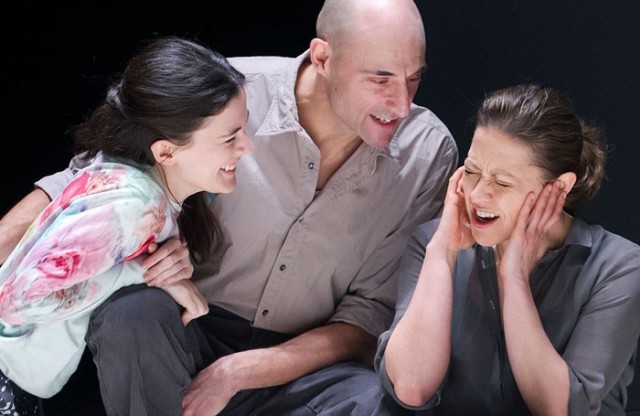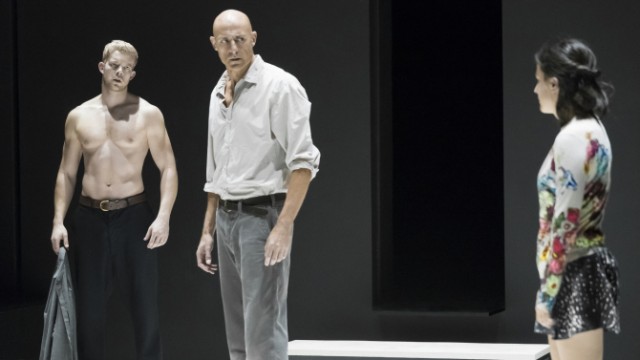
Phoebe Fox, Mark Strong, and Nicola Walker star as a family about to face some ugly truths in A VIEW FROM THE BRIDGE (photo by Jan Versweyveld)
Lyceum Theatre
149 West 45th St. between Broadway & Sixth Ave.
Tuesday – Sunday through February 21, $30-$135
www.aviewfromthebridgebroadway.com
As you enter the Lyceum Theatre to see Belgium-born, Amsterdam-based director Ivo van Hove’s gripping, Olivier Award–winning transformation of Arthur Miller’s A View from the Bridge, the curtain is up, and on the stage is a giant rectangular gray cube. It doesn’t quite reach the bottom, so you can get a teasing glimpse of the floor through a translucent border. On either side of the cube are six rows of rising pews, where some of the audience sits, like a jury waiting to hear the evidence. As if unveiling a magic trick, the cube slowly rises to the rafters, and onstage are Eddie Carbone (Mark Strong) and Louis (Richard Hansell), two Red Hook longshoremen furiously scrubbing their mostly bare bodies like they’re trying to cleanse their inner souls. “Justice is very important here,” a suited observer notes, strolling outside the two-foot-high bench that encircles three sides of the stage, with a nondescript door on the back wall. The easygoing man is Alfieri (Michael Gould), a neighborhood lawyer who is part Greek chorus, part Our Town–like narrator of this twentieth-century tragedy about misguided love, immigration, honor, morality, and, yes, justice. Eddie is the conscience of the play, a hardworking man who holds tight to his convictions, determined to make a better life for his orphaned niece, Catherine (Phoebe Fox), whom he is raising with his wife, Beatrice (Nicola Walker), a stabling influence. When Catherine is offered a job as a stenographer, the overprotective Eddie prefers that she finish school first. “That ain’t what I had in mind,” he says. Eddie and Beatrice take in two of Beatrice’s cousins from Sicily, Marco (Michael Zegen) and Rodolpho (Russell Tovey), illegal immigrants who have snuck into New York on a boat. While Marco is looking to work hard for several years, sending money back home to his wife and kids before making enough to return to Sicily and be with them again, Rodolpho wants to remain in New York and become a performer. When the light-hearted, flashy Rodolpho starts displaying what Eddie considers questionable tendencies — “The guy ain’t right,” Eddie says again and again — while also showing interest in Catherine, Eddie decides to step in between them, setting off a series of battles that have grave consequences.

Passions ignite in Ivo van Hove’s staging of Arthur Miller’s A VIEW FROM THE BRIDGE (photo by Jan Versweyveld)
Originally staged as a one-act in 1955 and then turned into a two-act show the next year directed by Peter Brook and starring Richard Harris and Anthony Quayle, A View from the Bridge is a stark examination of the American dream in mid-twentieth-century Brooklyn. Van Hove, who over his twenty-five-year career has created unique interpretations of works by Ingmar Bergman (Scenes from a Marriage, Persona), Luchino Visconti (Ludwig II), John Cassavetes (Faces, Husbands), Henrik Ibsen (Hedda Gabler), Pier Paolo Pasolini (Teorema), Tony Kushner (Angels in America), Eugene O’Neill (Mourning Becomes Electra, Long Day’s Journey into Night), and many others, in addition to helming the recent world premiere of Lazarus, his New York Theatre Workshop collaboration with David Bowie and Enda Walsh, gets to the gritty heart of A View from the Bridge, his first Miller adaptation, to be immediately followed by his version of The Crucible, which begins previews on Broadway at the end of February. Van Hove, who has also directed numerous operas, focuses on the operatic aspects of Miller’s narrative in this Young Vic production, highlighting oversized emotions, sexual jealousy, and fierce power struggles as the characters seem in the grip of psychological forces sometimes beyond their control, playing out to their inexorable conclusion. The stage, designed by van Hove’s longtime partner, Jan Versweyveld, is set up like a boxing ring, as the characters go at one another both verbally and physically; even Alfieri eventually becomes more than just a narrator, getting involved in the action as he steps through the door and into the middle of it all. Inside the “ring,” everyone is barefoot as raw passion bubbles to the surface and ugly truths are spat out. In his Broadway debut, the tall, bald Strong (The Imitation Game, Low Winter Sun) is a sensation, giving a brutally honest performance that has him barely able to stand up for his curtain call at the end, the exhaustion palpable all over his face and body. Fox is sweetly vulnerable as the tough-talking young woman caught between childhood and becoming an adult, still wanting to be that little girl while also exploring her burgeoning sexuality. Tom Gibbons’s sound design features a cinematic score that will not be to everyone’s taste, while the controversial ending will thrill some and disappoint others. And then, after two complex, intense, intermissionless hours, the gray cube comes back down, and the magic is put away until the next performance.